Summary
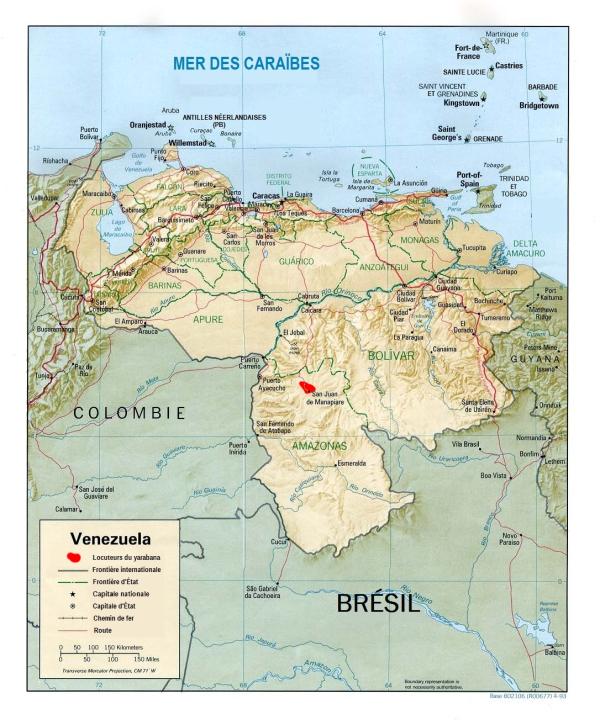
CIA 2012 World Factbook Map in Yabarana, an indigenous language of Venezeula.
The Bolivarian Republic of Venezuela (the formal name since 1999) has a dominant presidential system and authoritarian government.
After gaining independence from Spain in 1821, Venezuela’s governing system reflected Latin America's political culture of caudillismo (strongman rule) for much of its history, with only brief periods of democratic governance. In 1958, however, Venezuela emerged as a stable democracy even as much of Latin America was turning to military or other dictatorship.
In 1998, a former military officer, Hugo Chávez, was elected president. Undertaking what he called a “Bolivarian Revolution,” he again moved the country away from democracy and centralized power in the presidency. His hand-picked successor, Nicolás Maduro, gained power in a disputed election in 2013. After an opposition coalition decisively won elections to the National Assembly in 2015, Maduro “rebelled” against the elected legislature in an auto golpe (self-coup) to govern Venezuela as a dictatorship. In July 2024, Maduro claimed victory in the presidential election and repressed all opposition to retain power despite clear proof that an opposition candidate who was allowed to run had won by a landslide (see Current Issues).
Freedom House today categorizes Venezuela in the “Not Free” category with among the worst ratings in the world. At the same time, Venezuelan society continues to assert itself reflecting the country’s democratic past. It has an organized and unified civic and political opposition to Maduro’s rule. In the most recent election for president, Maduro declared victory despite a clear landslide vote in favor of the united opposition candidate (see both Free Elections and Current Issues).
Located on the Caribbean Sea in northeast South America, Venezuela is the world's 32nd largest country by area. The current estimated population is about 28 million (40th in the world). Due to political and economic conditions, an estimated 5-6 million people have left the country as migrants (the second largest mass migration in the world next to Syria). Since 2011, the economy has been in free-fall, along with its oil production, the country’s dominant export. From 2011 to 2022, Venezuela went from 33rd to 91st in world ranking in nominal Gross Domestic Product (GDP) according to the International Monetary Fund. The economy rebounded slightly in 2024 with the lifting of some US sanctions. For 2025, projected GDP is $110 billion (rising to 72nd in the world). Per capita GDP, once among Latin America’s highest, is now among its lowest (131sth in the world) at $4,019 per pear.
History
The Garden of Eden
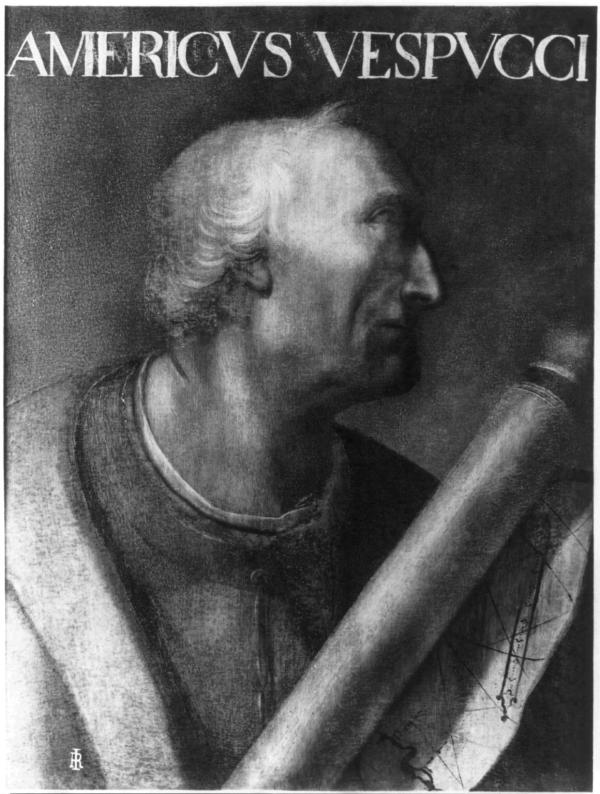
A stamp of Amerigo Vespucci, who with Alfonso de Ojeda, “discovered” in 1501 that the landing of Columbus was on a continent. The two called the coast Venezuela because the indigenous stilt houses reminded them of Venice. Library of Congress Prints and Photos Division.
Venezuela’s territory was inhabited as early as 15,000 years ago. When Christopher Columbus landed on Venezuela’s northern coast in 1498, his third transatlantic voyage on behalf of the Spanish Kingdom, a number of indigenous peoples populated the region. The largest and most complex society was the Timoto-Cuica. Due to forced colonization, a large proportion of the indigenous population was later killed by disease and forced labor.
Columbus mistook the jagged coast for an island. Struck by its beauty, he believed that he had discovered the Garden of Eden. Soon after, the explorers Alfonso de Ojeda and Amerigo Vespucci landed on the north of present-day Brazil. They realized the entire northern coast was the tip of a large land mass and set out to explore the continent. They called the coast area Venezuela because the stilt houses of the indigenous population reminded them of Venice.
In 1522, Venezuela became the site of the first permanent Spanish settlement in South America. But the territory held less interest for Spanish authorities over time since it lacked the mineral riches found further south. By the late 16th century, however, Venezuela became a key agricultural producer of wheat and tobacco. The introduction of the more labor-intensive cocoa crop in the early 17th century led to increased importation of enslaved Africans.
In 1522, Venezuela became the site of the first permanent Spanish settlement in South America. . . . Venezuela became a key agricultural producer of wheat and tobacco. The introduction of the more labor-intensive cocoa crop in the early 17th century led to increased importation of enslaved Africans.
Venezuela's agricultural production established the colony as a key trading post. As the colony's prosperity grew, Spanish authorities made Venezuela in 1777 a separate Captaincy General (its designation of administration), with Caracas as its capital. Like most Spanish colonies, Venezuela developed a stratified social structure. It included peninsulares (Spanish settlers) and criollos (descendants of Spanish heritage), who were the dominant class; pardos or mestizos (those of mixed race), who comprised half the population; enslaved Africans and their descendants, who were 20 percent of the population; and indigenous groups, who comprised 10 percent.
The Fight for Independence
Capital residents chafed for a century at Spain’s control over their governance and trade. Still, most landowners in the regions remained loyal to the monarchy. In the early 1800s, when Napoleon installed his brother Joseph on the Spanish throne as part of his European conquests, members of the Caracas City Council overthrew Venezuela’s governor in 1810 and declared themselves a ruling junta loyal to the imprisoned king, Ferdinand VII.
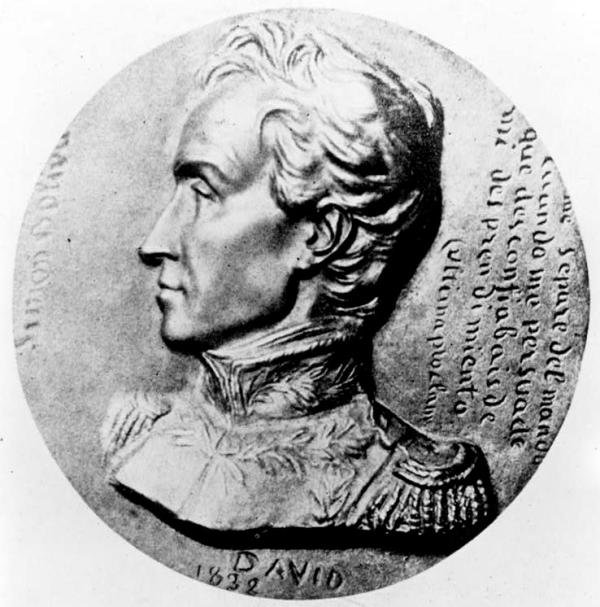
Simón Bolívar, the “Libertador” or “Liberator,” depicted on a medallion.
In 1811, some Council members led by the national revolutionary Simón Bolívar went further. They seized control over the junta, declared full independence from Spain and established Venezuela’s First Republic. This action began the wars of independence in Latin America.
Initially, Loyalists to Spain and King Ferdinand VII took the upper hand once the king was restored to the throne on Napoleon’s military defeat by Europe's monarchical powers. But Bolívar led inspiring military victories in a neighboring colony (comprising Columbia, Ecuador and Panama) and then in Venezuela itself. As the Liberator (Libertador) of the united territories, he was elected “dictator” of what was now called the Republic of Gran Columbia. Spain recognized the Republic’s independence in 1823.
As Bolívar continued the wars of liberation in Peru and Bolivia, the Republic of Gran Columbia became politically divided between Bolivar’s followers and liberals who opposed the Liberator’s insistence on a strong executive. Gran Columbia was also divided territorially. When Bolívar retreated from politics due to illness (he soon died from tuberculosis), another hero of the wars of independence, General José Antonio Páez, succeeded him as leader and formally withdrew Venezuela from Gran Columbia in 1830.
The Century of Caudillismo
Venezuela's history after independence from Spain in 1811 reflected the region's general political culture of caudillismo (strongman rule).
Venezuela's history after independence from Spain in 1811 reflected the region's general political culture of caudillismo (strongman rule).
Under a system of limited suffrage, General Páez was elected president twice. Seeking political stability, Páez negated provisions in his own constitution in order to replace himself as leader in 1846 with General José Tadeo Monagas of the Liberal Party. Monagas promptly exiled Páez and, fulfilling his party’s platform, abolished slavery in 1854. Stability was not achieved, however. Monagas installed his brother as his successor. He was quickly ousted. Páez returned in 1861 to take control of the government but was also ousted in a coup two years later. He died in exile in New York.
The ensuing century of caudillismo had little respite. The long military rule of General Juan Vicente Gómez (1908–35) was particularly severe. He eliminated the political opposition, appointed all members of a puppet legislature and made the constitution a personal tool for control. It was during this time that the discovery of oil resources propelled Venezuela’s economy to be the most successful on the continent.
From Democratic Revolution Back to Dictatorship
The death of the dictator Juan Gómez in 1935 led to a more liberal period under reformist military leaders. A new constitution in 1936 was adopted and political prisoners were freed. A new president, General Eleazar López Contreras again tried to stifle political opposition but the leaders of the failed student revolt in 1928, now released from prison, formed a new and dynamic social democratic party, Acción Democrática (AD). It gained strong support from workers in municipal and congressional elections in 1943 and 1944.
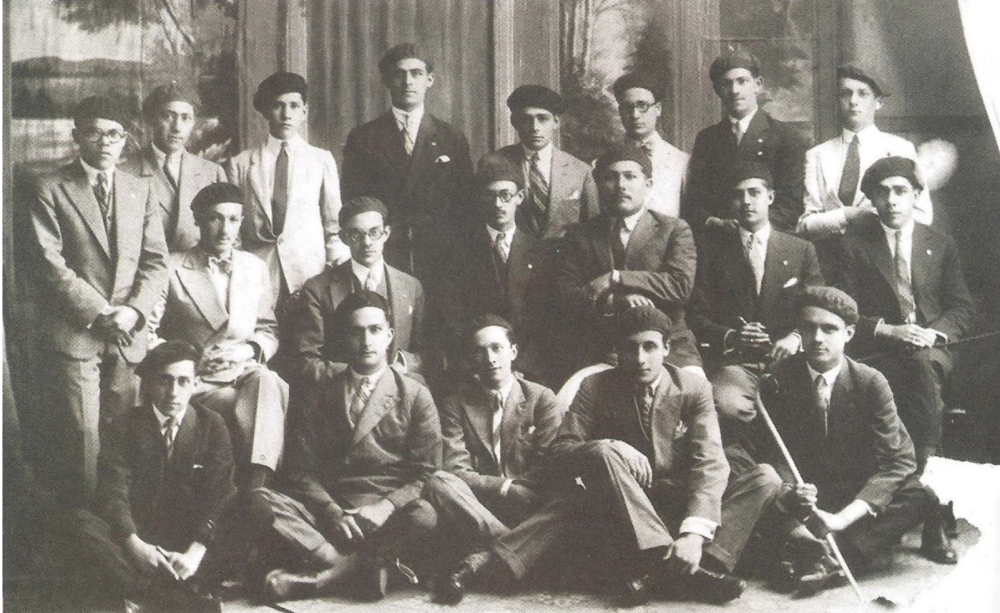
Student protests in 1928 were suppressed by a military regime but gave rise to a new generation of democratic leaders who formed the social democratic Acción Democrática party. Public Domain.
Local, parliamentary and presidential elections were held in 1946 and 1947 under a new electoral law that guaranteed universal suffrage for the first time in Venezuela’s history.
When General López Contreras tried to alter the congressional results by fraud, military reformers carried out a coup d’état. The military group asked Rómulo Betancourt, as head of AD, to lead a new junta with the aim of transitioning to full democracy under a new constitution. Local, parliamentary and presidential elections were held in 1946 and 1947 under a new electoral law that guaranteed universal suffrage for the first time in Venezuela’s history. AD candidates won large majorities at all levels running on a radical platform of land reform, taxing oil profits at 50 percent and introducing universal public education.
Feeling threatened by the AD’s far-reaching agenda, Venezuela's conservative political forces carried out another coup in 1948. The coup’s leader, General Marcos Evangelista Pérez Jiménez, reversed AD’s policies and again plunged the country into dictatorship. After ten years under Jiménez’s brutal rule, an aborted third coup set off a nationwide general strike led by the National Patriotic Union, a group that encompassed liberal-minded military members, Acción Democrática members and other groups. President Jiménez was forced into exile to the Dominican Republic.
Venezuela’s 40-year period of democracy and then its subsequent return to authoritarian rule is described in the next section and Current Issues.
Free, Fair and Regular Elections
Until the national and municipal elections of 1946–47, Venezuela’s history was dominated by caudillismo with the country’s president and legislature elected under a limited franchise based on property, race and gender restrictions.
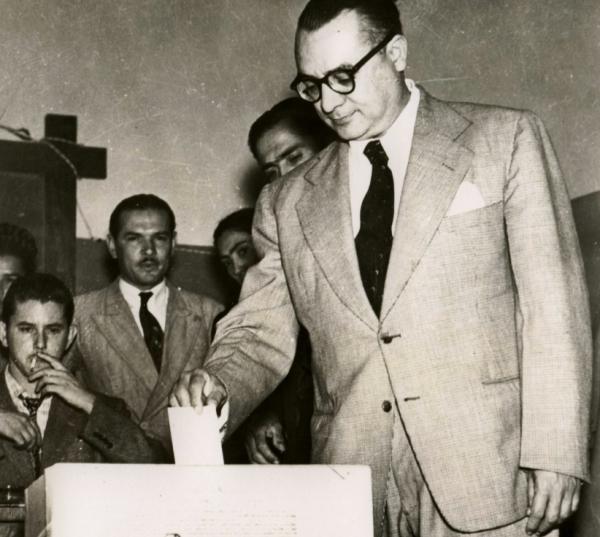
Rómulo, leader of Acción Democrática, headed the first democratic government in Venezuela in 1945-48. Here voting in the 1946 election for a constituent assembly. Creative Commons License. Courtesy of Rómulo Betancourt Foundation.
Universal suffrage was achieved in the 1946-47 elections, which were won by the progressive Acción Democrática party. A coup in 1948 stopped Venezuela’s democratic progress and established a brutal dictatorship. A general strike in 1958 forced the dictator from power and restored democracy with universal suffrage. Under a political party agreement called the Punta Fijo Pact, Venezuela had free, fair and regular elections for four decades (described below).
The election of ex-military officer Hugo Chávez in 1998 returned the country back to the tradition of caudillismo. Under a populist authoritarian platform, Chávez engaged in political confrontation, weakened democratic institutions, manipulated elections and ruled by decrees. Dying from cancer, Chavez engineered his succession by his vice president, Nicolás Maduro, in 2013. Over the next 10 years, Maduro overturned fully Venezuela’s electoral system, established dictatorial rule and brought the country to economic crisis. In July 2024, Maduro claimed another term as president and repressed all opposition to retain power despite clear proof that an opposition candidate who was allowed to run had won by a landslide (see Current Issues).
1958: A New Lease on Democracy
Venezuela’s Fourth Republic was established in 1958 and restored the democratic constitution adopted in 1945. Free elections with universal suffrage were held under an agreement called the Punta Fijo Pact. It required all of the country's parties, left and right, to accept the result and to work together regardless of the outcome.
Free elections with universal suffrage were held [in 1958] under an agreement called the Punta Fijo Pact. It required all of the country's parties, left and right, to accept the result and work together regardless of the outcome.
Rómulo Betancourt, still Acción Democrática’s leader, won the first presidential election in 1958. He initiated an unprecedented period of democratic civilian rule. Mindful of the previous backlash to its program, the AD leadership tried to achieve a political consensus around policies that included nationalizing the oil industry, agrarian reform, public works, welfare programs, universal public education and public-private industrial initiatives. Betancourt pointed to these achievements in contrast to respective left-wing and right-wing dictatorships imposed in nearby Cuba and Dominican Republic, both of whose leaders made attempts to overthrow the Venezuela government. He established what became known as the Betancourt Doctrine, which refused to recognize regimes that came to power by violence or by coup.
From Strong Democracy to Weak
Raúl Leoni, the Acción Democrática candidate, easily won the 1964 presidential election, but a split in the party allowed Rafael Caldera, the longtime leader of the Social Christian Party (COPEI), to win the presidency in 1968. From 1969 to 1993, power alternated between COPEI and Acción Democrática. Both parties used periodic increases in oil prices to expand public sector spending, but public oversight was not strong enough to stem a rise of public sector corruption.
The election of ex-military officer Hugo Chavez in 1998 returned the country back to the tradition of caudillismo.
The issue of corruption became particularly salient during the presidential terms of Acción Democrática leader Carlos Andrés Pérez. In his first term in the mid-1970s, his government nationalized foreign oil and steel companies. In his second term, from 1989 to 1993, he reversed course to implement an IMF-driven austerity policy during a period of oil-price reduction. There were two coup attempts during Pérez’s second administration, one in 1992 by a low-level military officer named Hugo Chávez. Neither succeeded, but both damaged the president's legitimacy. In 1993, near the end of his term, Pérez was impeached for corruption and removed from office. Former president Rafael Caldera of COPEI won the next election as the leader of a broad coalition. But he was unable to quell growing political discontent fueled by triple digit inflation and increasing levels of poverty.
The "New" Bolivarian Revolution
In the mid-1990s, Hugo Chávez re-emerged to lead a new radical party. He was elected president in December 1998 on an anti-establishment platform that championed the poor. He claimed a mandate to end Punta Fijoism (referring to the 1958 pact establishing the Fourth Republic), which he blamed for creating "a rigged system." He ushered in what he called the Fifth Republic Movement to create a socialist state. In fact, he restored caudillismo in a new form. It was given the term “chavismo.”
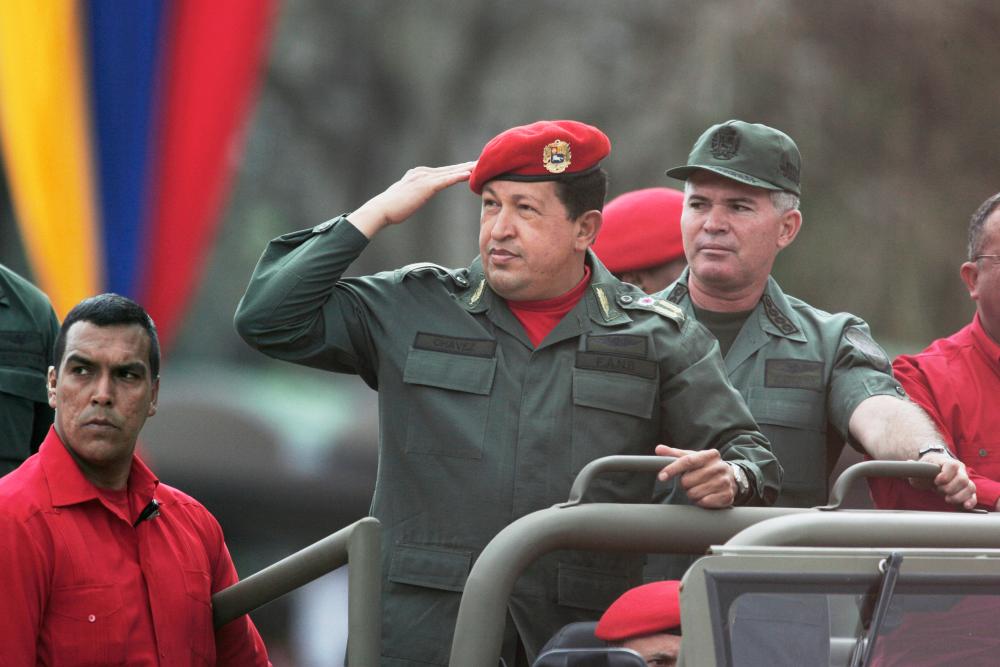
An officer who once organized a failed coup, Hugo Chávez won the 1998 presidential election and returned Venezuela to caudillismo, or strongman rule. Shown above at a military parade in 2009. Shutterstock. Photo by Hugo Escalana.
Upon assuming office, Chávez called elections to form a constitutional assembly that were won by his supporters, known as “Chavistas.” A new constitution, approved in a referendum later that year, added a sixth year to the presidential term, got rid of the presidency's one-term limit, replaced the bicameral legislature with a unicameral one and gave the president power to enact laws by decree. Over time, Chávez used decree powers to take firm control of the state administration, judiciary, electoral commission and ultimately much of the economy and broadcast media.
Over time, Chávez used decree powers to take firm control of the state administration, judiciary, electoral commission and ultimately much of the economy and broadcast media.
Large public demonstrations were organized in April 2002 to protest Chávez’s growing control. Several military leaders used them to try to establish a temporary junta but officers sympathetic to Chávez restored him to power. The opposition subsequently gathered 3.2 million signatures on a petition to force a referendum on Maduro’s presidency. Held in August 2004, Chávez claimed victory. Domestic and international monitoring organizations, however, disputed the outcome citing irregularities and intimidation.
Most opposition parties boycotted the December 2005 parliamentary elections on the grounds that there could not be a fair vote under the Electoral Commission controlled by Chavez's party. As a result, pro-Chávez forces, now consolidated in the Unified Socialist Party of Venezuela (PSUV), gained complete dominance over the legislature. Chávez then claimed an easy re-election victory over a divided opposition in the December 2006 presidential election.
Populist Dictatorship Entrenched
Chávez’s stated model for governance was the communist dictator Fidel Castro, whom he emulated in revolutionary rhetoric and anti-American stances. In foreign policy, Chávez allied Venezuela with Cuba and countries with left-wing leaders in Bolivia, Ecuador and Nicaragua to create the Bolivarian Alliance for the Americas.
Domestically, Chávez consolidated his presidential powers and ruled in increasingly authoritarian manner. He nationalized the communications and electricity industries by decree and carried out large government subventions for the poor, including large housing projects. A December 2010 decree expanded broadcast restrictions to the internet and allowed government interception and monitoring of internet communications. A Law on Political Sovereignty and National Self-Determination threatened non-governmental organizations (NGOs) with sanctions for receiving foreign donations and hosting foreign visitors who criticized the government. Chávez also tried to take over the Confederation of Venezuelan Labor (CTV) but failed to gain support among workers. He then established a rival front union federation to undermine the CTV.

Despite increasing repression and unfair electoral conditions, Hugo Chávez lost a referendum in 2009 on constitutional amendments to cement his role. They were then enacted as regular legislation. Above, supporters of the "NO" vote celebrate their brief victory. Creative Commons License. Photo by Guillermo Estevez.
Opposition Gathers Force in Elections, But Not Power
For the first time, Chávez lost a ballot. The official tally was 51 to 49 percent, indicating that the actual margin was larger. Chávez accepted the outcome but then went about passing many of the provisions as laws in a rubber-stamp legislature.
In 2009, Chávez brought 66 constitutional amendments to a public referendum to further consolidate power, including ending presidential term limits altogether and instituting greater decree powers. For the first time, Chávez lost a ballot. The official tally was 51 to 49 percent, indicating that the actual margin was larger. Chávez accepted the outcome but then went about passing many of the provisions as laws in a rubber-stamp legislature.
Seeing the power of united action, the previously divided opposition, made up of diverse political parties, coalesced in a Unity Roundtable (MUD) ahead of the 2010 parliamentary elections. According to the official tally, the MUD won 47 percent of the vote to 48 percent for the pro-Chávez PSUV. The electoral law provisions, however, awarded the PSUV a solid majority, 98 out of 165 seats in parliament.
For the 2012 presidential elections, the MUD put forward Henrique Capriles, a popular governor of the province encompassing Caracas, the capital, to challenge Chávez, who was seeking a third six-year term. Chávez claimed a 55 to 44 percent victory. Again, international and domestic monitors catalogued numerous cases of voter intimidation and electoral manipulations.
The Rise of Maduro
After the election, Chávez announced a recurrence of stomach cancer. He named his vice president, Nicolás Maduro, as his designated successor prior to his death on March 5, 2013. Still, under the constitution, Maduro was required to hold a new presidential election. He announced a snap election for April and used similar tools as his predecessor to manipulate the electoral process. The MUD again put forward Capriles. Campaigning on a platform to fix a fast-deteriorating economy and end authoritarian rule, he gained wide popular support.
Maduro claimed a narrow victory over Capriles of less than 1 percent. Domestic and international monitors once again challenged the outcome but the monitors’ complaints were dismissed and large protests were violently suppressed by police. There were seven deaths and hundreds injured. Maduro was inaugurated as Chávez’s successor.
After an Election, Establishing Dictatorship
As the economy worsened with triple-digit inflation, high unemployment and food shortages, Maduro grew more strident in his rhetoric and took more repressive actions.
As the economy worsened with triple-digit inflation, high unemployment and food shortages, Maduro grew more strident in his rhetoric and took more repressive actions. Major opposition figures were arrested and prosecuted for treason. Yet, as December 2015 parliamentary elections approached, domestic and international pressure prompted Maduro to release the leading opposition figures from jail. The tide of opposition to Maduro’s and PSUV’s rule grew. Despite unfair conditions to ensure a pro-government result, Venezuelan voters gave the opposition MUD coalition a decisive victory, winning every region and tallying 56 percent of the national vote. Three indigenous community members who were elected also sided with the opposition.
President Maduro declared himself “in rebellion” against the new parliament in 2016. He declared an economic emergency and exerted greater decree powers. The Supreme Tribunal, Venezuela's highest court stacked with Maduro's appointees, invalidated all laws passed by the National Assembly.
The National Assembly formally declared Maduro a dictator to try to remove him from office. In response, Maduro established an extraconstitutional Constituent Assembly to supersede the National Assembly. He then called a snap presidential election in 2018 and banned opposition candidates. He received 68 percent of the vote, according to the official tally, but there was just a 46 percent turnout due to an opposition boycott. Given the invalidity of the presidential election, the National Assembly, still meeting, declared the Assembly leader Juan Guaidó as interim president.
Maduro ordered police, military and security services to undertake a heightened level of repression. They arrested opposition leaders and activists, repressed trade unions and NGOs, shut down media outlets and used massive force against protesters.
Nicolás Maduro’s snap presidential election in 2018 was not widely recognized internationally. More than fifty governments, including the United States, as well as the European Union, took the unusual step to recognize Juan Guaidó as the legitimate president when the National Assembly elected him according to provisions in the Constitution. Maduro, however, remained fully in control of the government. International pressure and economic sanctions were ineffective in removing Nicolas Maduro from power.
Maduro ordered police, military and security services to undertake a heightened level of repression. They arrested opposition leaders and activists, repressed trade unions and NGOs, shut down media outlets and used massive force against protesters. Maduro engineered the election of a new speaker to the National Assembly by barring the majority of members from the opposition from entering the building.
More recent developments are described below.
Current Issues
The regime held parliamentary elections in December 2020 to fill the mandate for the National Assembly for 2021-26. Opposition parties boycotted, noting that full government control over the National Electoral Commission (CNE) precluded fair elections or tabulations. Ninety-one percent of the seats were won by the PSUV. The boycott, however, was widely observed. The CNE itself reported that the election had just 30.5 percent turnout. The 2015 National Assembly members met to extend their mandate to 2021 and re-affirmed their election of Juan Guaidó as leader and interim president. But domestic and international support for Guaidó waned as EU governments rescinded recognition.
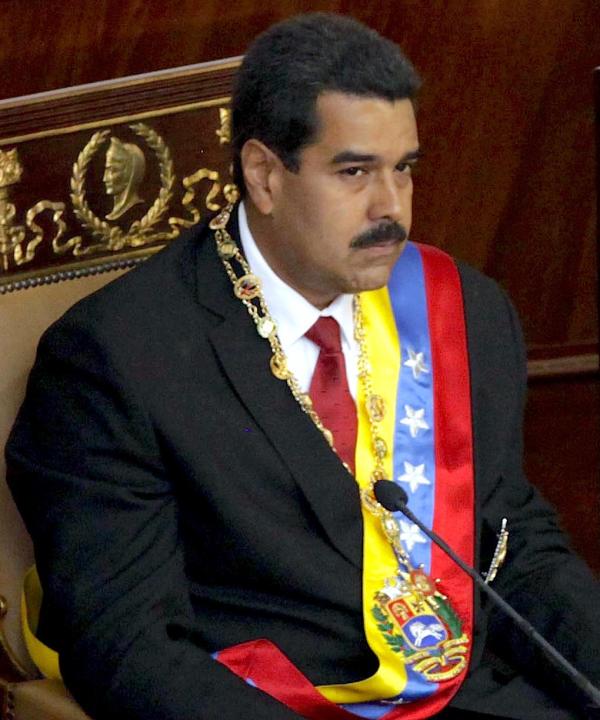
Nicolas Maduro, shown here assuming the presidency in 2013 after Hugo Chávez’s death. He won subsequent presidential elections under clearly unfair conditions. Creative Commons License. Chancellery of Ecuador.
Facing economic crisis and maneuvering to gain an easing of US sanctions, the Maduro government agreed to meet with opposition party representatives in Mexico City in 2021 to discuss upcoming municipal and regional elections. Opposition members were allowed to join the CNE but it remained under government control. Previously, local and regional elections were won by a united opposition. In these elections, the opposition was divided. Opposition parties won a majority of votes cast nationally but pro-government candidates won plurality or majority victories for 20 of 23 regional governorships and 212 out of 335 mayoralties, reducing the opposition’s political hold in local governance.
Venezuela’s hardening political dictatorship and economic collapse has resulted in a mass exodus, with up to 7.3 million people (one quarter of the population) leaving the country since 2016 according to the UN High Commissioner for Refugees. Some have returned but most have maintained temporary status in neighboring countries; more than half a million Venezuelans have migrated to the United States to seek asylum. In 2023, there was a stabilization of the economy due to increased oil production and an easing of sanctions (see below), but extreme poverty remained at a high level and much of the population continued to face a humanitarian emergency and extreme food and medical insecurity.
Venezuela’s hardening political dictatorship and economic collapse has resulted in a mass exodus, with up to 7.3 million people (25 percent of the population) leaving the country since 2016 according to the UN High Commissioner for Refugees.
In June 2023, the regime banned the leading opposition candidate for the 2024 presidential election, Mariá Corina Machado. But she continued to run in a primary held by the Democratic Unitary Platform (PUD), a new opposition alliance, in October. After her decisive victory, the Supreme Tribunal of Justice (TSJ) ruled that the primary was illegal and nullified the vote outcome on the grounds that the CNE, many of whose members had suddenly resigned in June, was not functioning and the PUD had “self-managed” its primary. The National Assembly subsequently appointed new members to the CNE.
The US administration under President Biden hoped to negotiate with the Maduro regime for a fairer election process in the 2024 presidential election. In exchange for the U.S. easing some sanctions on oil production and sales, Maduro agreed to release a number of political prisoners, allow an opposition candidate to run and accept an independent election observer team. The PUD selected Edmundo González Urrutia, an unassuming diplomat and politician, as its candidate instead of Machado. To prevent the regime from stealing the election, the PUD organized an extensive electoral monitoring strategy to obtain copies of vote tallies at around 30,000 local precincts. González, running on the Unity Platform to end Maduro’s authoritarian rule and restore the country’s economy, campaigned alongside Machado to huge crowds around the country. On election day, July 28, there were long lines at many precincts despite high levels of intimidation. The PUD reported a turnout of 61 percent.
On election day, July 28, there were long lines at many precincts despite high levels of intimidation. . . . The PUD declared that according to its independent tallies, González had won by 67 percent to 30 percent, which accorded with both pre-election and election day polling results.
The CNE announced a fraudulent result: Maduro had won the election with 52 percent of the vote to González’s 43 percent. The CNE claimed a turnout of just 52 percent. But it refused to release any official tally of the results. The international monitoring organization allowed to observe the election, the Carter Center, announced that the results were not credible and also that the election had been held under unfair conditions. It documented widespread voter intimidation, manipulation of the voting rolls and irregularities in tabulation. Few governments, except for dictatorships, accepted the results. Even leaders of countries nominally allied with Venezuela, such as Brazil and Columbia, did not recognize the official result.
The PUD declared that according to its independent tallies, González had won by 67 percent to 30 percent, which accorded with both pre-election and election day polling results. The Washington Post reviewed copies of 23,720 precinct-level tally sheets collected by the opposition (representing about 80 percent of voting machines nationwide). These confirmed the 2-1 victory of González and the higher estimated turnout. (The New York Times did a similar review.)
Maduro continued to claim victory and ordered a crackdown that included night-time drive-by killings and detentions of thousands of activists. Leaders in the military and security services have asserted their loyalty to Maduro.
Massive demonstrations protesting the official result were held, but Maduro continued to claim victory and ordered a crackdown that included night-time drive-by killings and detentions of thousands of activists. Leaders in the military and security services have asserted their loyalty to Maduro.
In early September, the Supreme Court certified the results claimed by the CNE despite there still being no provision of official tallies. Following the certification, Edmundo González was threatened with arrest and forced to sign a document accepting the results in order to exit the country. He has since declared the document invalid.
Neither domestic nor international efforts to pressure Maduro to accept the actual result of the election succeeded. He carried through with an inauguration ceremony to another term in early January 2025.
The content on this page was last updated on .
